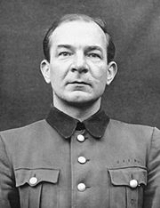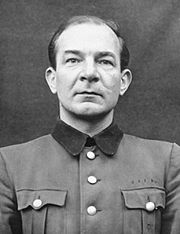
Joachim Mrugowsky
Encyclopedia

Waffen-SS
The Waffen-SS was a multi-ethnic and multi-national military force of the Third Reich. It constituted the armed wing of the Schutzstaffel or SS, an organ of the Nazi Party. The Waffen-SS saw action throughout World War II and grew from three regiments to over 38 divisions, and served alongside...
. Senior Hygienist at the Reich Physician SS, SS and Walfen SS Colonel, defendant in the Doctors Trial.
Early life and education
Mrugowsky's father was a general practitionerGeneral practitioner
A general practitioner is a medical practitioner who treats acute and chronic illnesses and provides preventive care and health education for all ages and both sexes. They have particular skills in treating people with multiple health issues and comorbidities...
, who was killed at the beginning of World War I
World War I
World War I , which was predominantly called the World War or the Great War from its occurrence until 1939, and the First World War or World War I thereafter, was a major war centred in Europe that began on 28 July 1914 and lasted until 11 November 1918...
. In 1925, Mrugowsky began his studies of natural sciences and medicine in Halle. He completed the studies in 1930-1931 with a medical doctorate and a doctorate of natural sciences. 1930-1931 he was the Hochschulgruppenführer (University group leader) of the National Socialist German Students' League
National Socialist German Students' League
The National Socialist German Students' League was founded in 1926 as a division of the NSDAP with the mission of integrating University-level education and academic life within the framework of the National Socialist worldview...
branch at the University of Halle. After a two-year internship, he became an assistant at the Hygiene Institute of the University of Halle.
Mrugowsky was made an associate professor in the area of hygiene at the University of Berlin, September 1944.
Career in the Third Reich
Since 1930, Mrugowsky had been involved in the Nazi ideology, first being the group leader of a local National Socialist German Students' Association then the NSDAP party member (No. 210,049). In 1931, he joined the SS, where he achieved the rank of OberführerOberführer
Oberführer was an early paramilitary rank of the Nazi Party dating back to 1921. Translated as “Senior Leader”, an Oberführer was typically a Nazi Party member in charge of a group of paramilitary units in a particular geographical region...
in both the General SS and the Waffen SS.
Mrugowsky coordinated human experimentation
Human experimentation
Human subject research includes experiments and observational studies. Human subjects are commonly participants in research on basic biology, clinical medicine, nursing, psychology, and all other social sciences. Humans have been participants in research since the earliest studies...
at the Sachsenhausen concentration camp
Sachsenhausen concentration camp
Sachsenhausen or Sachsenhausen-Oranienburg was a Nazi concentration camp in Oranienburg, Germany, used primarily for political prisoners from 1936 to the end of the Third Reich in May, 1945. After World War II, when Oranienburg was in the Soviet Occupation Zone, the structure was used as an NKVD...
near Berlin
Berlin
Berlin is the capital city of Germany and is one of the 16 states of Germany. With a population of 3.45 million people, Berlin is Germany's largest city. It is the second most populous city proper and the seventh most populous urban area in the European Union...
. This included testing of biological warfare agents, including poisoned bullets.
In 1940, as the troop physician of an SS "Das Reich" Division hospital company, Mrugowsky participated in the conquest of Western Europe
Western Europe
Western Europe is a loose term for the collection of countries in the western most region of the European continents, though this definition is context-dependent and carries cultural and political connotations. One definition describes Western Europe as a geographic entity—the region lying in the...
.
Trial and execution
He was implicated in all medical experimentsNazi human experimentation
Nazi human experimentation was a series of medical experiments on large numbers of prisoners by the Nazi German regime in its concentration camps mainly in the early 1940s, during World War II and the Holocaust. Prisoners were coerced into participating: they did not willingly volunteer and there...
, with the exception of the aviation ones, which were conducted on concentration camp prisoners. Mrugowsky was condemned to death in August 1947, and executed on June 2, 1948.

